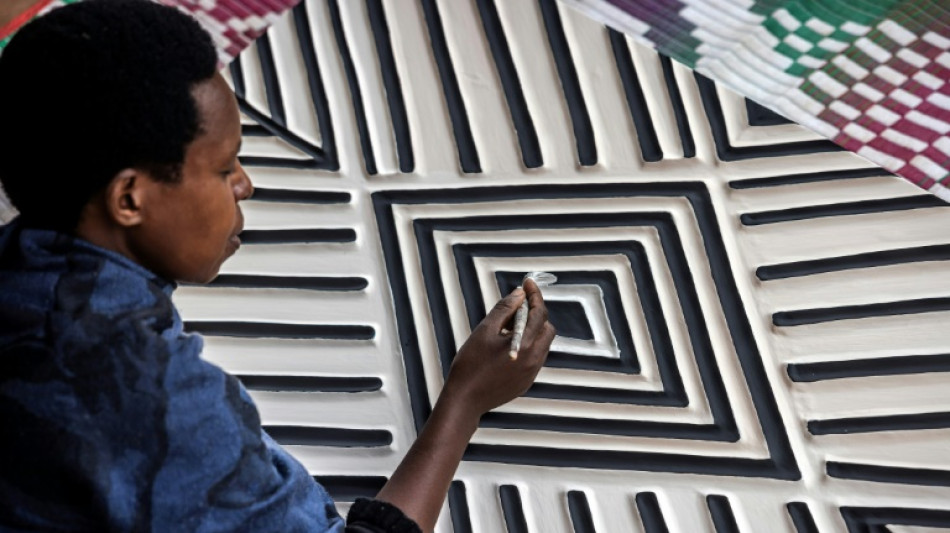
-
 European states say Navalny poisoned with dart frog toxin in Russian prison
European states say Navalny poisoned with dart frog toxin in Russian prison
-
Braathen hails 'drastic' changes after Olympic gold

-
 De Minaur eases past inconsistent Humbert into Rotterdam final
De Minaur eases past inconsistent Humbert into Rotterdam final
-
Eurovision 70th anniversary live tour postponed

-
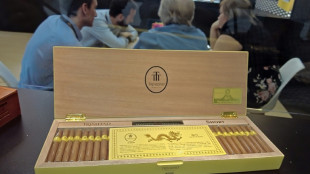 Cuba cancels cigar festival amid economic crisis
Cuba cancels cigar festival amid economic crisis
-
Son of Iran's last shah urges US action as supporters rally in Munich
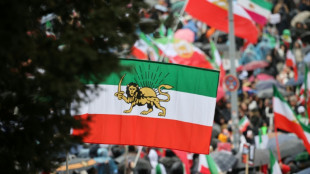
-
 Jansen helps South Africa limit New Zealand to 175-7
Jansen helps South Africa limit New Zealand to 175-7
-
Braathen wins unique Winter Olympic gold for Brazil, Malinin seeks answers

-
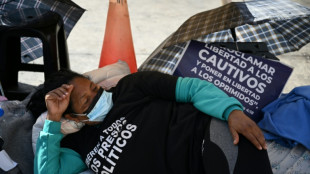 Relatives of Venezuela political prisoners begin hunger strike after 17 freed
Relatives of Venezuela political prisoners begin hunger strike after 17 freed
-
Ten-man West Ham survive Burton battle to reach FA Cup fifth round

-
 International crew set to dock at space station
International crew set to dock at space station
-
Suryakumar says India v Pakistan 'not just another game'

-
 Brazilian Olympic champion Braathen is his own man - and Norway's loss
Brazilian Olympic champion Braathen is his own man - and Norway's loss
-
About 200,000 join Iran demonstration in Munich: police
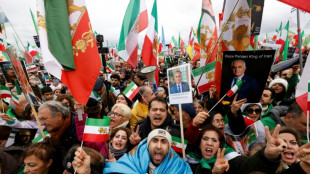
-
 Where did it all go wrong for 'Quad God' Malinin?
Where did it all go wrong for 'Quad God' Malinin?
-
Brazil's Braathen wins South America's first ever Winter Olympic gold

-
 Banton powers England to victory over Scotland at T20 World Cup
Banton powers England to victory over Scotland at T20 World Cup
-
Zelensky says all Ukrainian power plants damaged, calls Putin 'slave to war'

-
 Palestinian leader urges removal of all Israeli 'obstacles' on Gaza ceasefire
Palestinian leader urges removal of all Israeli 'obstacles' on Gaza ceasefire
-
Igor Tudor hired as Tottenham interim manager

-
 Rubio tells Europe to join Trump's fight, says it belongs with US
Rubio tells Europe to join Trump's fight, says it belongs with US
-
Winter Olympians have used 10,000 condoms

-
 Weston's skeleton Olympic gold a triumph over adversity
Weston's skeleton Olympic gold a triumph over adversity
-
England bowl Scotland out for 152 in T20 World Cup

-
 Bangladesh PM-to-be Rahman thanks those who 'sacrificed for democracy'
Bangladesh PM-to-be Rahman thanks those who 'sacrificed for democracy'
-
Sabalenka, Swiatek withdraw from WTA 1000 event in Dubai

-
 Brazil's Braathen in pole for historic Olympic giant slalom medal
Brazil's Braathen in pole for historic Olympic giant slalom medal
-
Top entertainment figures back under-fire UN Palestinians expert
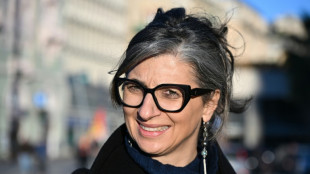
-
 Pakistan 'always ready' for India despite late green light: Agha
Pakistan 'always ready' for India despite late green light: Agha
-
Rubio tells Europe it belongs with US, calls it to join Trump's fight

-
 Tucker stars as Ireland crush Oman by 96 runs at T20 World Cup
Tucker stars as Ireland crush Oman by 96 runs at T20 World Cup
-
Rubio tells allies US and Europe 'belong together'

-
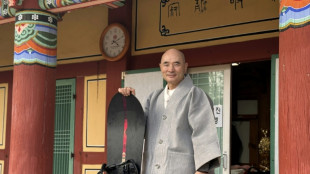 Snowboarding monk in spotlight after S. Korea's Olympic glory
Snowboarding monk in spotlight after S. Korea's Olympic glory
-
Bangladesh's Tarique Rahman poised to be PM as Islamists concede

-
 What does Greenland's mining industry look like?
What does Greenland's mining industry look like?
-
Greenland prepares next generation for mining future

-
 China top court says drivers responsible despite autonomous technology
China top court says drivers responsible despite autonomous technology
-
Sixers rookie Edgecombe leads 'Team Vince' to NBA Rising Stars crown

-
 Rubio at Munich security meet to address Europeans rattled by Trump
Rubio at Munich security meet to address Europeans rattled by Trump
-
Medal-winner Sato says Malinin paid for 'toxic schedule'

-
 Carney offers support of united Canada to town devastated by mass shooting
Carney offers support of united Canada to town devastated by mass shooting
-
All-in on AI: what TikTok creator ByteDance did next

-
 Healthy Ohtani has Cy Young Award in sights
Healthy Ohtani has Cy Young Award in sights
-
One of Lima's top beaches to close Sunday over pollution

-
 'Nothing is impossible': Shaidorov shocks favourite Malinin to make history
'Nothing is impossible': Shaidorov shocks favourite Malinin to make history
-
Malinin wilts at Olympics as Heraskevych loses ban appeal

-
 How Often Should I Get a Dental Cleaning in Coral Springs, FL?
How Often Should I Get a Dental Cleaning in Coral Springs, FL?
-
New to The Street to Broadcast Show #726 on Bloomberg at 6:30 PM EST Featuring Vivos Therapeutics (NASDAQ:VVOS), Aeries Technology (NASDAQ:AERT), Virtuix Holdings (NASDAQ:VTIX), and Stardust Power (NASDAQ:SDST)

-
 Epomaker HE30 One-Handed Hall Effect Mechanical Keyboard: Born for Gaming
Epomaker HE30 One-Handed Hall Effect Mechanical Keyboard: Born for Gaming
-
B2B Buzz Launches Integrated AI Framework to Combat Declining Returns in Single-Channel Outreach


Reviving a traditional art form in Rwanda after genocide
A 200-year-old Tutsi art form made with cow dung, Rwanda's imigongo painting tradition has experienced a revival in the Great Lakes nation three decades after the 1994 genocide, becoming a symbol of culture and unity.
Known for its raised black and white patterns, imigongo is widely believed to have been invented by a Tutsi prince in the 19th century.
Prince Kakira mixed cow dung and ash to create a material which he used to paint three-dimensional patterns on the walls of his palace in eastern Rwanda's Gisaka kingdom.
The tradition was named after "umugongo", the Kinyarwanda word for "spine", owing to its curved lines, and became popular among rural households where women would use dung and natural pigments made with soil, clay and aloe sap to decorate their homes.
Basirice Uwamariya, founder of the Kakira Imigongo Cooperative in eastern Kirehe district, told AFP she started making art when she was 15.
But the 1994 genocide targeting the Tutsi minority nearly wiped out the tradition, with almost all 15 members of Uwamariya's cooperative killed in a bloodbath that claimed around 800,000 lives across Rwanda, including moderate Hutus.
She lost her husband and multiple relatives, leaving her to fend for herself and her two sons.
"I lived in darkness, in silence," the 53-year-old said, recalling the loneliness that pushed her to revive the cooperative in 1996 and invite other genocide survivors to join her.
Since then, imigongo has evolved.
Traditional patterns exist side by side with modern designs featuring various colours. Natural pigments have been replaced by commercial paints.
Imigongo designs have made their way to upmarket studios and fashion boutiques, adorning garments and wooden artefacts alike, with a market that includes foreigners and Rwandans.
According to Theoneste Nizeyimana, manager of Azizi Life Studio in the capital Kigali, the tradition was once largely limited to eastern Rwanda.
"But after the genocide destroyed everything... people started thinking about how they can bring back their culture. Today, imigongo is appreciated by all Rwandans, not just Tutsi," he told AFP.
"Imigongo is something that brings people together," he said, pointing out that the Kigali boutique and studio holds painting classes for students whose ages range from four to 75 years old.
It also makes business sense, he said, with its instantly recognisable patterns helping to market "made in Rwanda" designs around the world.
Th.Berger--AMWN

